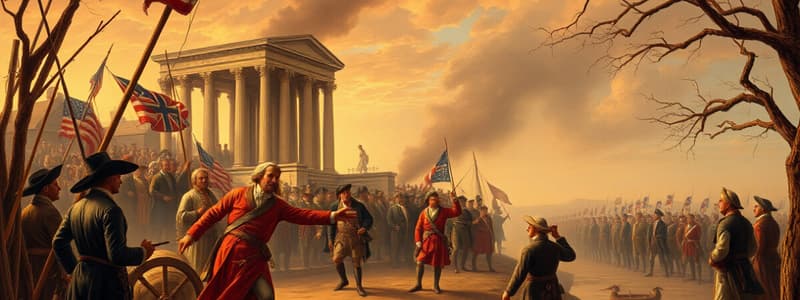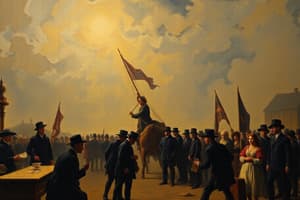Podcast
Questions and Answers
What economic factor primarily fueled resentment among American colonists leading to the American Revolution?
What economic factor primarily fueled resentment among American colonists leading to the American Revolution?
- Decreased crop yields
- High taxes on tea (correct)
- Low prices of tobacco
- High import duties on cotton
Which group played a significant role in the early stages of the French Revolution?
Which group played a significant role in the early stages of the French Revolution?
- The clergy
- The wealthy bourgeoise (correct)
- The working poor
- The aristocrats
What event was a direct response to the high price of bread and new taxes imposed by King Louis XVI?
What event was a direct response to the high price of bread and new taxes imposed by King Louis XVI?
- The Women's March on Versailles (correct)
- The storming of the Bastille
- The Declaration of the Rights of Man
- The fall of the Bastille
How did the outcomes of the harvest in 1788 impact the social conditions in France?
How did the outcomes of the harvest in 1788 impact the social conditions in France?
What was a commonality between the American and French revolutions?
What was a commonality between the American and French revolutions?
What social class was primarily involved in the revolt during the French Revolution?
What social class was primarily involved in the revolt during the French Revolution?
In what way did crop production contribute to the wealth of Western European countries?
In what way did crop production contribute to the wealth of Western European countries?
What was a significant outcome of the economic conditions leading to the French Revolution?
What was a significant outcome of the economic conditions leading to the French Revolution?
What was a significant impact of the rise of capitalism in the late 18th century?
What was a significant impact of the rise of capitalism in the late 18th century?
Which revolutions are highlighted as being part of the crisis at the end of the 18th century?
Which revolutions are highlighted as being part of the crisis at the end of the 18th century?
Which group was primarily responsible for planting crops on plantations in the American colonies?
Which group was primarily responsible for planting crops on plantations in the American colonies?
The Seven Years' War was significant to the revolutions because it:
The Seven Years' War was significant to the revolutions because it:
What term is used to describe the material conditions that concern revolutionaries?
What term is used to describe the material conditions that concern revolutionaries?
What common sentiment emerged among the working poor and the bourgeoisie during this period?
What common sentiment emerged among the working poor and the bourgeoisie during this period?
What characterized the revolts among peasants and workers from 1500 to 1800?
What characterized the revolts among peasants and workers from 1500 to 1800?
What economic system became dominant in Western Europe and the Americas in the late 18th century?
What economic system became dominant in Western Europe and the Americas in the late 18th century?
Flashcards are hidden until you start studying
Study Notes
Economic and Material Causes of Revolt
- The late eighteenth century was marked by significant upheaval, with revolutions reshaping societal structures globally.
- Key revolutions: American, French, and Haitian—these were driven by both political and economic motivations.
- The rise of capitalism, characterized by private property and increased production, dominated Western Europe and the Americas, leading to social disruptions.
A World in Crisis: The Eighteenth Century
- The establishment of plantations in American colonies resulted in a reliance on enslaved labor for crops like sugar and cotton.
- Wealth from plantations primarily benefited European landowners, contributing to economic disparities.
- The emergence of a new urban working class and a wealthier bourgeoisie led to widespread dissatisfaction with governing authorities.
- Numerous revolts occurred between 1500 and 1800, often suppressed violently by governments and aristocrats.
- Despite repression, successful revolutions broke out in America, France, and Haiti, indicating deep-rooted social tensions.
Material Causes of Revolt
- Revolutions were fueled by desires for liberty, political representation, and economic grievances like taxes and property rights.
- The Seven Years’ War (1756-1763) intensified economic strife, leading to unrest in colonies due to debt incurred by the British Empire.
The American Revolution
- It revolved around grievances over taxation; increased tea prices and decreased tobacco prices led to resentment among colonists.
- The British government's attempt to recover war debts through taxation catalyzed the quest for representation in Parliament.
- Plantation owners sought independence partly to maximize profits from crops maintained by enslaved labor.
The French Revolution
- Resentment towards aristocrats and church officials characterized the social landscape; the upper-middle class lacked political power despite wealth.
- Poor harvests in 1788 contributed to food shortages, causing unrest among lower social strata.
- King Louis XVI's imposition of new taxes, alongside rising bread prices, furthered discontent and incited protests.
- The Women’s March on Versailles in October 1789 symbolized the growing unrest, led primarily by the working poor but orchestrated by the bourgeoisie seeking power.
The Haitian Revolution
- Saint Domingue (Haiti) was the wealthiest colony globally, relying on enslaved labor to sustain its economy.
- The oppression and brutal conditions faced by enslaved people fueled desires for freedom and change, leading to a powerful revolt.
- Economic exploitation underpinned the Haitian struggle for liberty and marked a significant event in the broader context of revolutionary movements during this period.
Studying That Suits You
Use AI to generate personalized quizzes and flashcards to suit your learning preferences.




